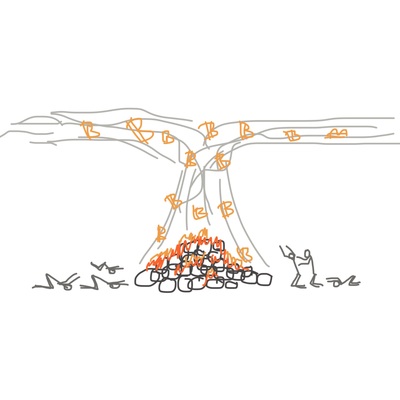The Apathy Implosion and Lessons in Leadership
I recently had a team implode around me. As is often the case, it wasn't some external stress that did the job so much as a lack of passion and strong leadership. It was a slow death but it almost seemed inevitable.
To rewind a bit, I've been taking the Tech Entrepreneurship course through the MIT/Stanford Venture Lab (VLab) online platform. It's a semester-based course where the students form small teams and build a plausible business plan, which is presented at the end of the course in January.
The first couple weeks were a frenzy of virtual team building, where the 30,000+ students that began networked and facebooked themselves into groups of 3-5. That was a fascinating experience in and of itself -- which approaches were destined to be successful? I saw cases of future founders championing their idea, seeking to rally some free labor to develop it. Then there were groups who bonded across continents because they shared a passion for solving a particular problem. Often, the easiest way to begin chunking the enormous initial set of students was by geography. The San Francisco locals Facebook group eventually swelled to over 30 people.
My team of San Franciscans formed not based on a shared interest in a particular idea, but precisely because we were idea agnostic. We found each other through posts embracing the approximate philosophy, "We're here to learn and if it results in a viable business (of which the odds are slim), great, but that will be a side effect of maximizing the learning experience." We formed with the highest of hopes.
Our first couple of exercises went great. We tackled projects in business canvas writing and pitching with the enthusiasm of the over motivated. The Skype meetings, scheduled around five very busy lives, sometimes seemed to drag on and detour a bit, but we were still learning about each other and were very careful to be considerate of all opinions.
The course matured and it came time to settle on an idea. We'd generated a fair number of them through the early assignments but our interests were disparate enough that the ideas were quite diverse. The process wasn't contentious but it took some time for us to settle on a need that one of our members felt close to home: babysitting.
"SitterConnect", as we called it, was an app designed to solve the problem of parents, particularly new families without a babysitter network, to book last minute sitters they could trust. So we went forward with it, executing well on our initial business model canvas and the "commercial" for it. There may not have been a lot of passion for the product or problem among most of the team, but we were hard working people so we surveyed a bunch of "customers" online, hit up friends and family, and even spoke with a few families on the street"¦ basically enough to justify the need for such an idea without diving in too deep.
The VLab Tech Entrepreneurship course closely follows the Lean Startup doctrine, which is relentlessly focused on customer development and testing your idea in the market repeatedly in order to find product/market fit. This is where we really started running into problems. As the assignments called for more and more validation, particularly after we'd identified a competitor doing precisely the same thing, the time between our emails began to increase. People sent out their availability without anyone setting the meeting. Suddenly other things kept coming up and it got easier and easier to push back the homework. Finally, we had a call the evening before a major deadline when nothing had yet been accomplished and admitted it: we were just going through the motions and the project was dead.
--
Why did we fail? We got a bunch of smart and motivated people together with the shared goal of learning and we ended up fading out with a shrug of apathy. It seems like an improbable result.
The key to this experience is leadership. Perhaps it was just a function of throwing brand new people together and expecting them to gel into a team, but from the beginning we utilized a very carefully democratic approach to everything. I'm pretty sure everyone has experienced this effect, where a group is so careful not to step on the toes of its members that progress is painfully slow.
The hardest thing to do in a business (for most people) is to get out and talk to customers, and we were no different. It's easy to execute concrete tasks. Creating the slide deck, writing the business model canvas, wire framing a website"¦ all these things were easy (and fun). Building product isn't the hard part. The hard part is making sure you're building the *right* thing, and that requires feedback from the market: your customers.
We weren't efficient but we got things done in the early stages. But of five team members, only one had any connection whatsoever to our target demographic and so customer development was a pain to do. It represented the first real mental hurdle for us as a team and by the time we got there, there wasn't enough momentum left to get over it. We were smart and motivated but what we needed was an idea champion.
There are countless situations that require someone to step forward and take charge. It starts with small things like meetings. To make a meeting effective, someone needs to set the agenda, keep things on task, and delegate responsibility (and deadlines) at the end. In order to do this effectively, that leader needs to understand the capabilities and dynamics of his or her teammates and, more impotently, needs to possess a vision for how things will go forward.
That vision is necessary both to drive the agenda in the right direction and especially to inspire the team. As I said, we were all hard working, but as we pushed forward with an idea that most of us felt little personal connection to, no one stepped forward to take the lead. The natural leader of a project is the idea's creator/champion, because that person is, by definition, the wellspring of passion for a project. Ours never really stepped forward and then left the country, leaving a natural vacuum behind.
Had we possessed a strong leader who was willing to assertively manage the project and assign responsibilities, I'm highly confident that we would still be on track today[1]. Most individuals, when shown a strong path forward and definitive responsibilities, are willing to plug themselves into that workflow and add to the greater whole (even if it involves difficult work). The hardest part is finding the person who is willing to deal with all the added BS to put together that framework for a team's success and drive the vision forward.
--
A startup is one of the most difficult challenges that a team can undergo and so understanding the dynamics of leadership and successful teams is crucial to getting started on the right foot. I am grateful to have learned some of these lessons firsthand in an environment with no real world consequences for failure. You can take all the courses on management, team building and leadership you want, but living it firsthand is a much different and infinitely more valuable experience.
[1] It certainly would have helped if we'd chosen an idea for which more of us would be willing to assume the mantle of leadership. A fundamental weakness in our choice was that, while it seemed plausible to all of us, it really only *inspired* one of us (the only parent in the group), thus putting the onus on that person to step up or risk a leadership vacuum.






